Select program/project:
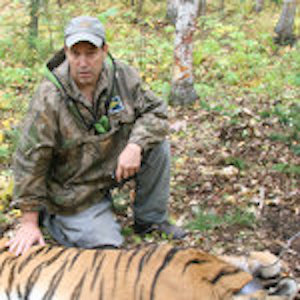 |
Director, Russia
Born and raised near Boston, Massachusetts, USA, Dale Miquelle received a BS from Yale University, a MS from the University of Minnesota, and a Ph.D. from the University of Idaho. Dr. Miquelle spent a year working on the Tiger Ecology Project in Chitwan National Park, Nepal, which cemented his interest in both international conservation efforts and large carnivore research. Dr. Miquelle worked for 6 years studying wildlife in Alaska with the US Forest Service (as part of his Ph.D.) and two years training international students in wildlife research with the Smithsonian Institution before joining the Sikhote-Alin State Reserve and Hornocker Wildlife Institute’s Siberian Tiger Project, now part of WCS. Dr. Miquelle is the Country Director for the Wildlife Conservation Society’s Russia Program, and coordinates research and conservation actions to protect large carnivores and the ecosystems upon which they depend, focusing mainly in Northeast Asia.
|
 |
Dale Miquelle
Director, Russia
Born and raised near Boston, Massachusetts, USA, Dale Miquelle received a BS from Yale University, a MS from the University of Minnesota, and a Ph.D. from the University of Idaho. Dr. Miquelle spent a year working on the Tiger Ecology Project in Chitwan National Park, Nepal, which cemented his interest in both international conservation efforts and large carnivore research. Dr. Miquelle worked for 6 years studying wildlife in Alaska with the US Forest Service (as part of his Ph.D.) and two years training international students in wildlife research with the Smithsonian Institution before joining the Sikhote-Alin State Reserve and Hornocker Wildlife Institute’s Siberian Tiger Project, now part of WCS. Dr. Miquelle is the Country Director for the Wildlife Conservation Society’s Russia Program, and coordinates research and conservation actions to protect large carnivores and the ecosystems upon which they depend, focusing mainly in Northeast Asia.
|
|
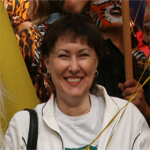 |
Deputy Director, Russia
Tatiana Perova received a Masters Degree in English Language and Philology at the Far Eastern State University in 1982. She began volunteering for the Hornocker Wildlife Institute’s Siberian Tiger Project (now part of WCS) in 1993. Since 2000 she has been the Deputy Director of the WCS Russia office.
|
 |
Tatiana Perova
Deputy Director, Russia
Tatiana Perova received a Masters Degree in English Language and Philology at the Far Eastern State University in 1982. She began volunteering for the Hornocker Wildlife Institute’s Siberian Tiger Project (now part of WCS) in 1993. Since 2000 she has been the Deputy Director of the WCS Russia office.
|
|
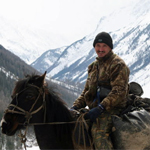 |
Field Researcher
Aleksandr worked for the Siberian Tiger Project from 1998-2006, a collaboration between the Sikhote-Alin Biosphere Reserve and WCS (initially, the Hornocker Wildlife Institute). In 2008, he received an undergraduate degree in Ecology from the Far Eastern State University in Vladivostok. He has trained in large mammal capture and immobilization methods, and is often called to assist government agencies in human-tiger conflict situations throughout the region. Since 2006, Aleksandr has worked on a WCS-Institute of Biology and Soil Sciences collaborative project studying the Far Eastern leopard in south-western Primorskii Krai, where camera trap surveys and biomedical screenings of individuals are conducted. Aleksandr is currently working on his Ph.D.
|
 |
Alexander Reebin
Field Researcher
Aleksandr worked for the Siberian Tiger Project from 1998-2006, a collaboration between the Sikhote-Alin Biosphere Reserve and WCS (initially, the Hornocker Wildlife Institute). In 2008, he received an undergraduate degree in Ecology from the Far Eastern State University in Vladivostok. He has trained in large mammal capture and immobilization methods, and is often called to assist government agencies in human-tiger conflict situations throughout the region. Since 2006, Aleksandr has worked on a WCS-Institute of Biology and Soil Sciences collaborative project studying the Far Eastern leopard in south-western Primorskii Krai, where camera trap surveys and biomedical screenings of individuals are conducted. Aleksandr is currently working on his Ph.D.
|
|
 |
Technical Consultant
Graduated from the Far Eastern Technical Fishery University, where he trained as a marine engineer. Since 1995, Andrei has worked for EPT/USAID Project in the Russian Far East. In 1997, Andrei began providing technical support for the Sikhote-Alin Reserve and Hornocker Wildlife Institute’s Siberian Tiger Project (now part of WCS) and since 2000 has acted as a technical consultant for all WCS Russia projects.
|
 |
Andrei Dotsenko
Technical Consultant
Graduated from the Far Eastern Technical Fishery University, where he trained as a marine engineer. Since 1995, Andrei has worked for EPT/USAID Project in the Russian Far East. In 1997, Andrei began providing technical support for the Sikhote-Alin Reserve and Hornocker Wildlife Institute’s Siberian Tiger Project (now part of WCS) and since 2000 has acted as a technical consultant for all WCS Russia projects.
|
|
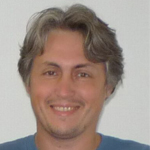 |
Programs Manager, Russia
Anton Semyonov has worked for the WCS Russia Program since 2006 managing the "Hunters and Tigers" program with the focus on Tiger Friendly Certification Project. The program aimed to providing economic returns for local communities and hunting associations that meet minimum requirements to protect tigers and their habitat. WCS assists them in developing of additional sources of income such as local and international tourism and sport hunting as well as harvesting and processing of non-timber forest products. Anton has more than 15 year experience working with environmental NGOs in the region. Professional interests include: working models of business based conservation; sustainable communities; strategic management.
|
 |
Anton Semyonov
Programs Manager, Russia
Anton Semyonov has worked for the WCS Russia Program since 2006 managing the "Hunters and Tigers" program with the focus on Tiger Friendly Certification Project. The program aimed to providing economic returns for local communities and hunting associations that meet minimum requirements to protect tigers and their habitat. WCS assists them in developing of additional sources of income such as local and international tourism and sport hunting as well as harvesting and processing of non-timber forest products. Anton has more than 15 year experience working with environmental NGOs in the region. Professional interests include: working models of business based conservation; sustainable communities; strategic management.
|
|
 |
Accounts Receivable Manager
Dan Li completed her M.Sc. in Genetics in 2011 and previously her B.Sc. in Biology in 2009 at Northeast Forestry University. After graduation she started engaging with environmental protection by monitoring factories discharging pollutants into steppe and wetlands, and studying migratory birds conservation from anti-poaching in Hulunbeir. Currently, Dan Li is project assistant for the WCS China Tiger Program. She participates in Amur Tiger and Leopard monitoring surveys and other conservation activities such as SMART patrolling and capacity training activities for local law enforcement agencies.
|
 |
Dan Li
Accounts Receivable Manager
Dan Li completed her M.Sc. in Genetics in 2011 and previously her B.Sc. in Biology in 2009 at Northeast Forestry University. After graduation she started engaging with environmental protection by monitoring factories discharging pollutants into steppe and wetlands, and studying migratory birds conservation from anti-poaching in Hulunbeir. Currently, Dan Li is project assistant for the WCS China Tiger Program. She participates in Amur Tiger and Leopard monitoring surveys and other conservation activities such as SMART patrolling and capacity training activities for local law enforcement agencies.
|
|
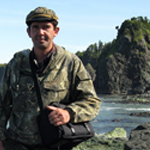 |
Project Leader, Siberian Tiger Project
Ivan, who specializes in large carnivores, has a PhD in biology and holds a position as an assistant professor and the head of the Laboratory of ecology and wildlife conservation in the Pacific Institute of Geography of the Russian Academy of Sciences in Vladivostok. Ivan has worked with WCS since 1998, participating in different programs such as the Siberian Tiger Project, Brown bear and Asiatic black bear research programs at the Sikhote-Alin Biosphere Reserve, and the Kamchatka brown bear research program. Ivan is presently the Siberian Tiger Project Coordinator.
|
 |
Ivan Seryodkin
Project Leader, Siberian Tiger Project
Ivan, who specializes in large carnivores, has a PhD in biology and holds a position as an assistant professor and the head of the Laboratory of ecology and wildlife conservation in the Pacific Institute of Geography of the Russian Academy of Sciences in Vladivostok. Ivan has worked with WCS since 1998, participating in different programs such as the Siberian Tiger Project, Brown bear and Asiatic black bear research programs at the Sikhote-Alin Biosphere Reserve, and the Kamchatka brown bear research program. Ivan is presently the Siberian Tiger Project Coordinator.
|
|
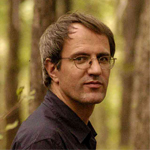 |
Project Leader, anti-fire and anti-poaching programs
Michiel Hоtte is a Dutchman with a master degree in economics from the University of Amsterdam. He has been involved in tiger and leopard conservation in the Russian Far East for more than 15 years. Michiel implements for WCS a fire management project in the habitat of the remaining 30 Amur leopards. Michiel also manages a project aimed at improving the protection of four protected areas that form core breeding habitat for Amur tigers. Michiel assists the protected areas in the introduction of a spatial patrol monitoring system.
|
 |
Michiel Hotte
Project Leader, anti-fire and anti-poaching programs
Michiel Hоtte is a Dutchman with a master degree in economics from the University of Amsterdam. He has been involved in tiger and leopard conservation in the Russian Far East for more than 15 years. Michiel implements for WCS a fire management project in the habitat of the remaining 30 Amur leopards. Michiel also manages a project aimed at improving the protection of four protected areas that form core breeding habitat for Amur tigers. Michiel assists the protected areas in the introduction of a spatial patrol monitoring system.
|
|
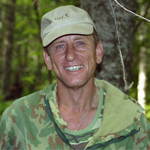 |
Field Adviser
Vladimir began working as an inspector for Sikhote-Alin Biosphere Reserve in 1979. In 1998 he started working for the Hornocker Wildlife Institute’s Siberian Tiger Project (now part of WCS) in Sikhote-Alin Reserve in 1999. Since 2000 Vladimir has been working for WCS as a technical consultant. Vladimir has extensive experience with camera-traps and radio-tracking, winter snow-tracking, and capture and immobilization of wild animals. He is always keen to share his knowledge with young specialists.
|
 |
Vladimir Melnikov
Field Adviser
Vladimir began working as an inspector for Sikhote-Alin Biosphere Reserve in 1979. In 1998 he started working for the Hornocker Wildlife Institute’s Siberian Tiger Project (now part of WCS) in Sikhote-Alin Reserve in 1999. Since 2000 Vladimir has been working for WCS as a technical consultant. Vladimir has extensive experience with camera-traps and radio-tracking, winter snow-tracking, and capture and immobilization of wild animals. He is always keen to share his knowledge with young specialists.
|
|
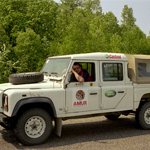 |
Mechanic and driver
Evgeniy has been working for the joint Sikhote-Alin Reserve and WCS's Siberian Tiger Project as a technical consultant since 2000.
|
 |
Yevgenii Gizhko
Mechanic and driver
Evgeniy has been working for the joint Sikhote-Alin Reserve and WCS's Siberian Tiger Project as a technical consultant since 2000.
|
|